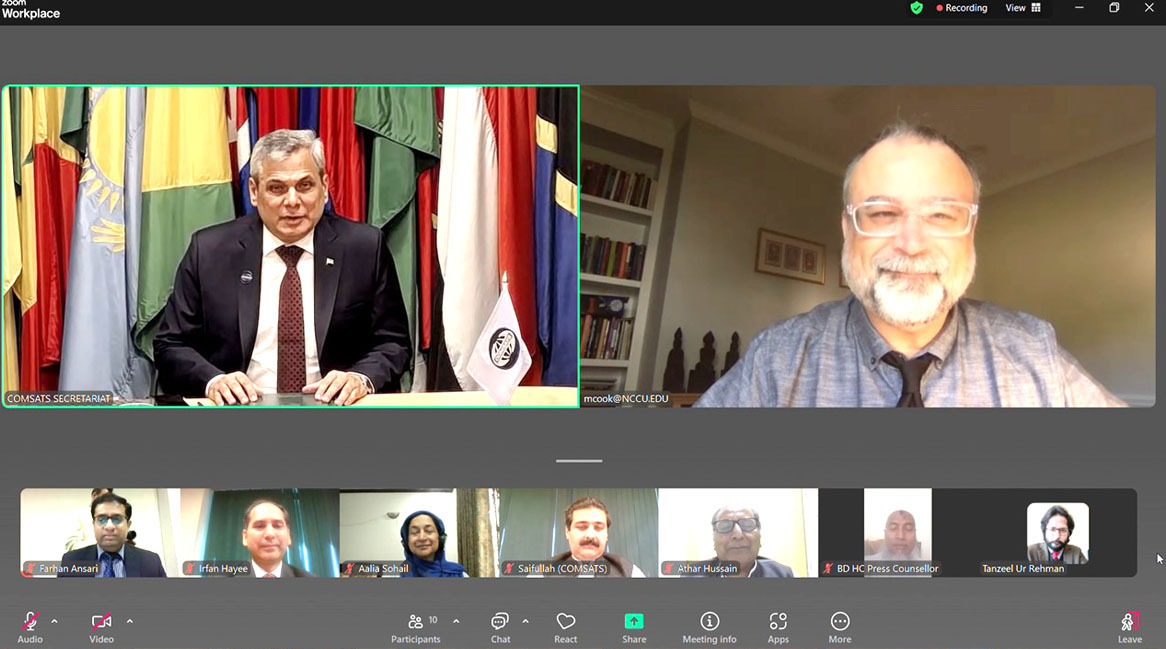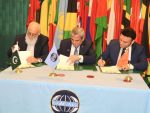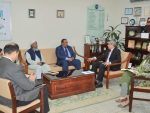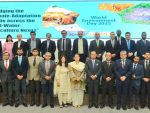In a significant step toward active participation in international carbon markets, Pakistan marked November 16, 2024, as “Carbon Market Day” at the Pakistan Pavilion during COP29. In this regard, COMSATS and the Ministry of Climate Change and Environmental Coordination (MoCC&EC) jointly organized high-profile two Panel Sessions, “High-level Dialogue on Strengthening governance frameworks for Carbon Markets in Global South” on 16th November during COP29. The panel discussion was part of the event at Pakistan’s Pavilion to unveil the nation’s Carbon Market Policy Guidelines and chart a course for future engagement.
Two prominent panel discussions held during COP29 delved deeply into the opportunities and strategies for developing Pakistan’s carbon market while ensuring alignment with the goals of the Paris Agreement. These sessions brought together distinguished experts and thought leaders from across the globe to share their experiences, provide strategic insights, and chart a path forward for Pakistan in the evolving landscape of carbon markets.
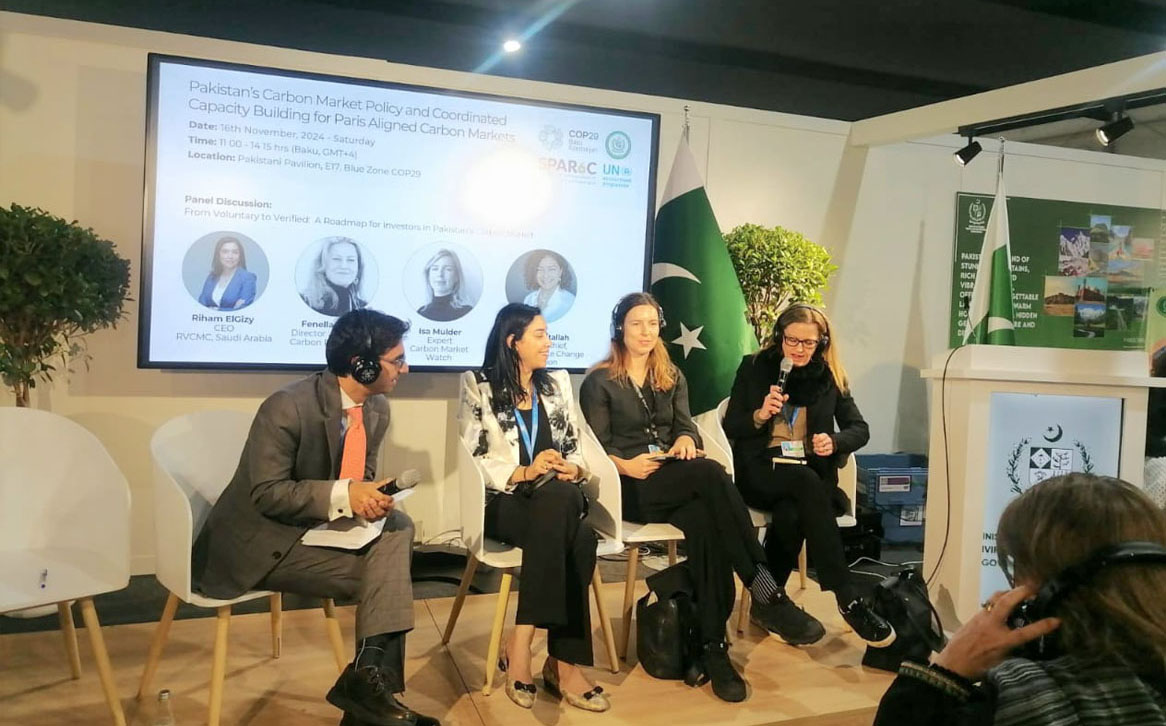
The first panel, moderated by Mr. Khurram Lalani, focused on identifying the key opportunities and challenges for Pakistan as it embarks on its journey toward establishing a robust carbon market. Ms. Mirey Atallah, Branch Chief at UNEP’s Climate Change Division and a senior figure in global climate policymaking, commended Pakistan for the significant progress marked by the unveiling of its Carbon Market Policy. Highlighting the complexities of implementation, she emphasized that the real work begins now and assured UNEP’s continued support to Pakistan’s Ministry of Climate Change and Environmental Coordination (MoCC&EC).
Ms. Riham Elgizy, CEO of the Regional Voluntary Carbon Market Company (RCVMC) in Saudi Arabia, brought insights from her pioneering work in developing voluntary carbon markets across the Middle East. She underlined the importance of transparency and integrity in establishing credibility for carbon markets. Cautioning against potential pitfalls, she advised Pakistan to carefully learn from the experiences of other nations that faced challenges during the adoption of carbon market frameworks.
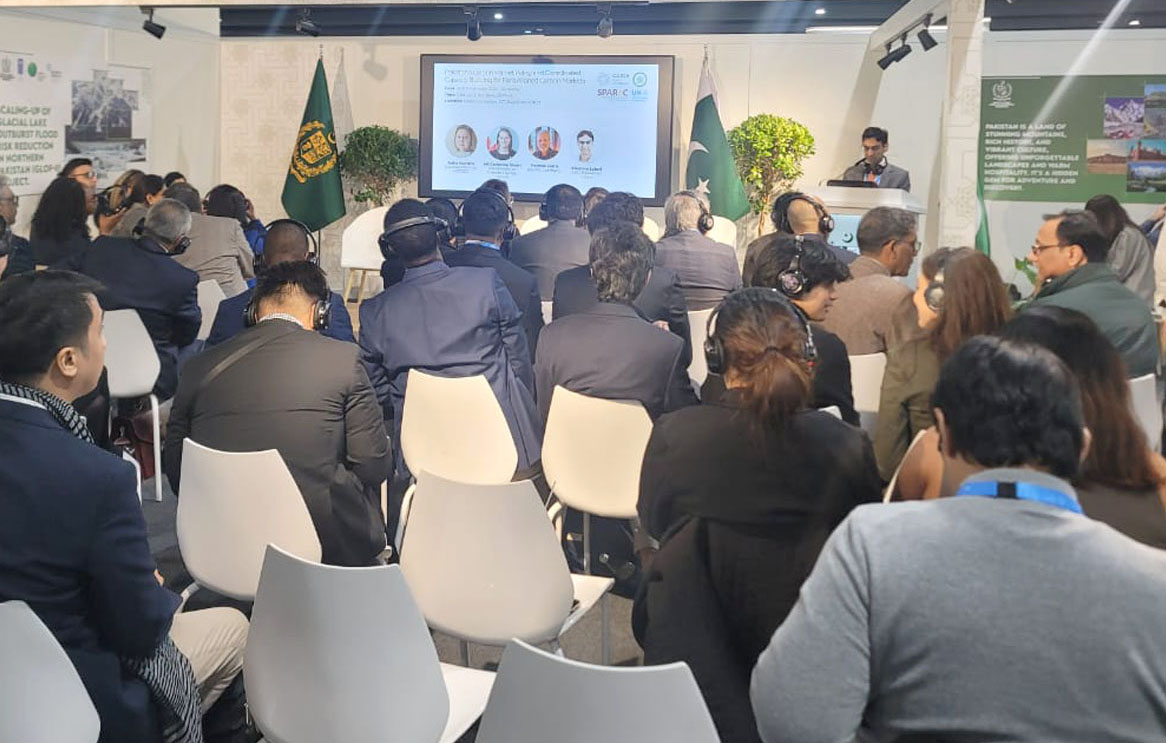
Ms. Isa Mulder from Carbon Market Watch, known for her steadfast advocacy for environmental integrity, stressed the importance of ensuring that carbon trading systems deliver tangible environmental benefits. Her perspective underscored the need for stringent regulatory oversight and robust mechanisms to prevent market inefficiencies.
The second panel discussion, moderated by Mr. Mark Kenber, Executive Director of the Voluntary Carbon Markets Initiative (VCMI), centered on innovative financing strategies and the potential of Paris-aligned carbon markets to drive sustainable development in Pakistan.
Mrs. Dawa Chhoeden, Chief Engineer at Bhutan’s Ministry of Energy and Natural Resources, shared Bhutan’s success in leveraging carbon credits to promote renewable energy projects. Her insights highlighted the importance of tailoring carbon market policies to national priorities while maintaining flexibility to adapt to evolving market dynamics.
Ms. Berioska Quispe, Director General of Climate Change and Desertification in Peru, detailed Peru’s initiatives in generating carbon credits through forest conservation and biodiversity projects. Her presentation underscored the value of preserving natural ecosystems as critical carbon sinks.
Mr. Chandra Shekhar Sinha, Global Lead for Carbon Markets and Finance at the World Bank Group, outlined strategies for mobilizing investments into climate projects in emerging economies. Emphasizing the critical role of private sector engagement, he provided actionable recommendations for fostering investor confidence in Pakistan’s carbon markets.
Mr. Amr Sobhy, Senior Climate Change Specialist at the Islamic Development Bank (IsDB), introduced the concept of sustainability bonds being launched by the IsDB. These bonds aim to provide financial support for low-carbon initiatives in member countries, offering Pakistan a new avenue for attracting development financing.
Ms. Adidjatou Hassan, President of the Benin National Carbon Projects Registration Authority, shared valuable lessons from Africa’s carbon market initiatives. Highlighting the challenges and opportunities faced by nations new to carbon markets, she encouraged Pakistan to adopt an inclusive and equitable approach while building its market structures.
Romina Khurshid Alam, Coordinator to the Prime Minister on Climate Change and Environment Coordination, underscored the potential of Article 6 of the Paris Agreement as a foundation for establishing equitable and transparent carbon markets in Pakistan. Acknowledging the nation’s vulnerability to climate change, she reaffirmed Pakistan’s unwavering resolve to tackle these challenges and capitalize on carbon market opportunities. “Today’s discussions mark an important milestone in shaping Pakistan’s climate action strategy,” she said. “By implementing Article 6, we can create cross-border cooperation that not only facilitates emissions reductions but also fosters sustainable development. This is a critical step toward ensuring that carbon markets contribute to both economic growth and social equity.”
The panels collectively emphasized the importance of creating a unified framework for carbon market operations in Pakistan. Plans to establish a One-Window Carbon Market Facility were unveiled, aiming to streamline transactions, enhance transparency, and support project developers. This facility will adhere to international standards of environmental integrity, ensuring that all activities align with global best practices.
Pakistan’s Carbon Market Policy Guidelines reflect a strong commitment to leveraging carbon markets for climate resilience, economic growth, and social inclusion. By incorporating lessons from global leaders and fostering international collaboration, Pakistan is positioning itself as a key player in the global effort to achieve net-zero emissions.


